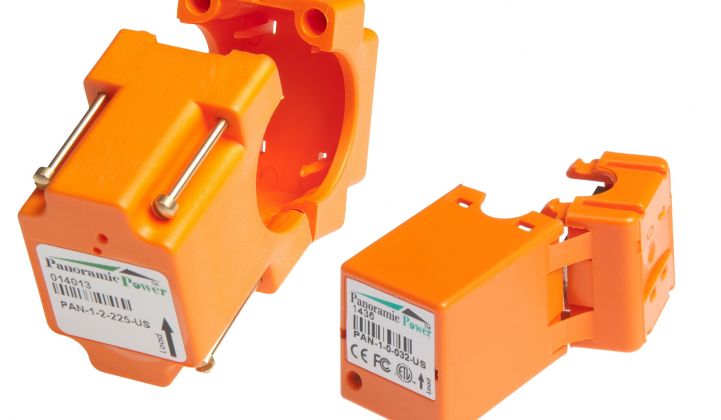There’s a key barrier between the technology that runs modern HVAC, lighting and other energy-intensive building systems today, and the quest to make it run more efficiently: a lack of energy data. Beyond the meters that record the entire building energy use, and perhaps some sub-metering for individual offices or building systems, there just isn’t that much real-time, granular energy measuring going on.
Panoramic Power wants to change that, one self-powered, circuit power sensor at a time. The Israel-based startup says its patent-pending technology allows each sensor to harvest enough energy from the circuit it measures to connect it and its fellow devices in a wireless mesh network, sending energy data every 10 seconds or so.
Those sensors create a wireless mesh network that connects to Panoramic’s P3E cloud-based analytics platform, which aligns the incoming flood of energy readings with the building systems using the energy, Safi Oranski, vice president of business development, said in an interview last week.
That’s useful to detect and alert existing building management systems (BMS) to anomalies in the way the system is working, to combat the common “drift” in well-tuned buildings back to inefficient status over time, he said. Or, in some cases, it can take the place of a BMS entirely, at a cost that’s five to ten times cheaper, he added.
Either way, the combination of real-time data and analysis can drive a 20-percent to 30-percent reduction in energy usage in most cases, with return on investment coming as early as a few days to six months to a year, he said. Panoramic has about 20 to 30 customer locations now using the technology, Oranski added.
While he wouldn’t name customers, they include retail settings such as an Israeli pharmacy chain and a California auto retailer, as well as hospitals, he said. The startup has raised $6 million so far from investors including Israel Cleantech Ventures and Greylock Partners, as well as Qualcomm Ventures via the wireless technology leader’s QPrize contest.
Monday marks the commercial launch of the company’s service, making it the latest effort to crack the code on a combination of wireless sensors and software analytics that’s both cheap enough and effective enough to break into the mass commercial building market.
We’ve seen a number of startups targeting wireless sensors for specific building environments, like factory floors or data centers. But many of them have since shifted away from sensors to focus on other markets. Take two erstwhile data center sensor startups Sentilla and Arch Rock -- Sentilla shifted from sensors to software, and Arch Rock was bought by Cisco to apply the startup’s technology to networking smart meters instead of buildings.
At the same time, startups like SCIEnergy and Sky Foundry say they can tap existing building energy and BMS data to deliver the same kind of energy reductions without adding new monitoring equipment. Taking it a step further, startups like FirstFuel and Retroficiency say they can delve into utility power meter data and other existing data sources and come up with energy footprints for buildings, without installing a single sensor.
Panoramic will face a twofold challenge in getting its solution adopted by more than early adopters in the commercial building space. First, it will have to prove its energy-harvesting, low-power mesh networked sensors can deliver their data across a variety of built environments. Sure, battery-less sensors and wireless mesh networks sound good -- cheap to install and maintain, they could break some price barriers that have kept sensors out of more prosaic commercial building environments.
But building engineers may well be leery of trusting technology that promises to run from ambient electricity. That’s one reason that smart lighting startups including Adura, Daintree Networks, Digital Lumens and Enlighted have pitched their wireless light-fixtures as potential nodes for numerous different building networking applications: they’re already connected to a power source.
The other test for Panoramic will be how effective its analytics engine is in delivering important, actionable alerts to building managers, instead of simply providing them with yet another dashboard of real-time information that’s too difficult to manage.
Panoramic’s technology, as well as the expertise of its co-founders David Almagor and Adi Shamir, is firmly rooted in the mesh networking field, not in the building energy management space. Oranski said the startup partners with energy consulting companies, engineers and other such building experts to make sure its data is being properly merged with the systems that keep them humming, and has primarily worked with five such (unnamed) partners to date.
As it deploys in more buildings, Panoramic is hoping to create analytics packages of its own to assist in that process, he said. Like all the other companies promising to apply their “big data” software expertise to the building energy efficiency space, Panoramic will have to prove it’s up to the task.



